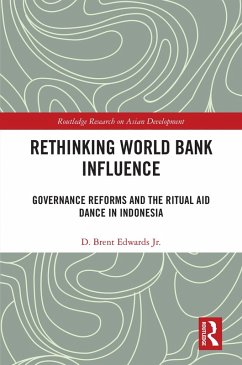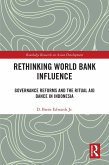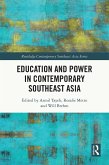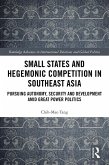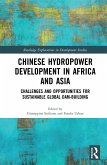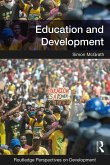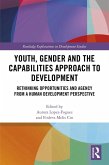D. Brent Edwards Jr.
Rethinking World Bank Influence (eBook, ePUB)
Governance Reforms and the Ritual Aid Dance in Indonesia
41,95 €
41,95 €
inkl. MwSt.
Sofort per Download lieferbar

21 °P sammeln
41,95 €
Als Download kaufen

41,95 €
inkl. MwSt.
Sofort per Download lieferbar

21 °P sammeln
Jetzt verschenken
Alle Infos zum eBook verschenken
41,95 €
inkl. MwSt.
Sofort per Download lieferbar
Alle Infos zum eBook verschenken

21 °P sammeln
D. Brent Edwards Jr.
Rethinking World Bank Influence (eBook, ePUB)
Governance Reforms and the Ritual Aid Dance in Indonesia
- Format: ePub
- Merkliste
- Auf die Merkliste
- Bewerten Bewerten
- Teilen
- Produkt teilen
- Produkterinnerung
- Produkterinnerung

Bitte loggen Sie sich zunächst in Ihr Kundenkonto ein oder registrieren Sie sich bei
bücher.de, um das eBook-Abo tolino select nutzen zu können.
Hier können Sie sich einloggen
Hier können Sie sich einloggen
Sie sind bereits eingeloggt. Klicken Sie auf 2. tolino select Abo, um fortzufahren.

Bitte loggen Sie sich zunächst in Ihr Kundenkonto ein oder registrieren Sie sich bei bücher.de, um das eBook-Abo tolino select nutzen zu können.
Why is it so hard for international development organizations-even ones as well-resourced and influential as the World Bank-to generate and sustain change in the way things are done in those countries where they work? This book provides an answer to the question.
- Geräte: eReader
- mit Kopierschutz
- eBook Hilfe
Andere Kunden interessierten sich auch für
![Rethinking World Bank Influence (eBook, PDF) Rethinking World Bank Influence (eBook, PDF)]() D. Brent Edwards Jr.Rethinking World Bank Influence (eBook, PDF)41,95 €
D. Brent Edwards Jr.Rethinking World Bank Influence (eBook, PDF)41,95 €![Education and Power in Contemporary Southeast Asia (eBook, ePUB) Education and Power in Contemporary Southeast Asia (eBook, ePUB)]() Education and Power in Contemporary Southeast Asia (eBook, ePUB)42,95 €
Education and Power in Contemporary Southeast Asia (eBook, ePUB)42,95 €![Small States and Hegemonic Competition in Southeast Asia (eBook, ePUB) Small States and Hegemonic Competition in Southeast Asia (eBook, ePUB)]() Chih-Mao TangSmall States and Hegemonic Competition in Southeast Asia (eBook, ePUB)47,95 €
Chih-Mao TangSmall States and Hegemonic Competition in Southeast Asia (eBook, ePUB)47,95 €![Chinese Hydropower Development in Africa and Asia (eBook, ePUB) Chinese Hydropower Development in Africa and Asia (eBook, ePUB)]() Chinese Hydropower Development in Africa and Asia (eBook, ePUB)51,95 €
Chinese Hydropower Development in Africa and Asia (eBook, ePUB)51,95 €![Education and Development (eBook, ePUB) Education and Development (eBook, ePUB)]() Simon McgrathEducation and Development (eBook, ePUB)39,95 €
Simon McgrathEducation and Development (eBook, ePUB)39,95 €![Youth, Gender and the Capabilities Approach to Development (eBook, ePUB) Youth, Gender and the Capabilities Approach to Development (eBook, ePUB)]() Youth, Gender and the Capabilities Approach to Development (eBook, ePUB)51,95 €
Youth, Gender and the Capabilities Approach to Development (eBook, ePUB)51,95 €![Dynamics of Change in East Asia (eBook, ePUB) Dynamics of Change in East Asia (eBook, ePUB)]() P. W. PrestonDynamics of Change in East Asia (eBook, ePUB)41,95 €
P. W. PrestonDynamics of Change in East Asia (eBook, ePUB)41,95 €-
-
-
Why is it so hard for international development organizations-even ones as well-resourced and influential as the World Bank-to generate and sustain change in the way things are done in those countries where they work? This book provides an answer to the question.
Dieser Download kann aus rechtlichen Gründen nur mit Rechnungsadresse in A, B, BG, CY, CZ, D, DK, EW, E, FIN, F, GR, HR, H, IRL, I, LT, L, LR, M, NL, PL, P, R, S, SLO, SK ausgeliefert werden.
Produktdetails
- Produktdetails
- Verlag: Taylor & Francis eBooks
- Seitenzahl: 294
- Erscheinungstermin: 13. April 2023
- Englisch
- ISBN-13: 9780429619823
- Artikelnr.: 67468716
- Verlag: Taylor & Francis eBooks
- Seitenzahl: 294
- Erscheinungstermin: 13. April 2023
- Englisch
- ISBN-13: 9780429619823
- Artikelnr.: 67468716
- Herstellerkennzeichnung Die Herstellerinformationen sind derzeit nicht verfügbar.
D. Brent Edwards Jr. is Graduate Chair of the Department of Educational Foundations and Associate Professor of Theory and Methodology in the Study of Education at the University of Hawai'i. His work focuses on (a) the global governance of education, (b) education policy, politics and political economy, with a focus on low-income countries, and (c) democratic and socially just alternatives to dominant education models. He is on the advisory board for the Comparative Education Review. Recent books include The Trajectory of Global Education Policy: Community-based Management in El Salvador and the Global Reform Agenda as well as Global Education Policy, Impact Evaluations, and Alternatives: The Political Economy of Knowledge Production, both with Palgrave Macmillan. Forthcoming in 2023 with Routledge is Globalization, Privatization, and the State: Contemporary Education Reform in Post-colonial Contexts. He is currently the Principal Investigator for a three-year USD 913,000 project funded by the Dubai Cares Foundation entitled "Crisis Management for Disaster Risk Reduction in Education Systems: Learning from the Elaboration and Integration of Technology-Focused Strategies in El Salvador, Honduras, and Colombia." This project was one of only two selected by Dubai Cares from among a pool of 173 that were submitted for its "E-Cubed" Research Envelope through which it supports evidence for education in emergencies. Previously, he was awarded Fulbright Funding for his work in El Salvador, in addition to holding visiting, affiliate, or research positions at George Washington University (USA), the Autonomous University of Barcelona (Spain), the University of Amsterdam (Netherlands), University of Central America (El Salvador), the University of the North (Colombia), The University of Tokyo (Japan), Waseda University (Japan), and the University of Auckland (New Zealand). Apart from being a consultant for the World Bank, he has worked on research funded by USAID, UNESCO, Education International, Global Campaign for Education, Open Society Foundations, and the Spencer Foundation. His work has been published in English, Spanish, Portuguese, and Japanese. He received his PhD in International Education Policy from the University of Maryland.
PART 1: APPROACHES TO UNDERSTANDING THE WORLD BANK. Chapter 1. The World
Bank and Social Sector Reform: An Introduction to Ritual Governance and the
Ritual Aid Dance. Chapter 2. Explaining Global-Local Policy Change and
Implementation: The Political Economy of Reform in Realist, Systems, and
Anthropological Perspective. Chapter 3. Participation in Development and
Education Governance: World Bank Thinking, Frameworks, and Results. PART 2:
THE EVOLUTION OF GOVERNANCE REFORMS. Chapter 4. Context and Origins of
Community-Driven Development in Indonesia. Chapter 5. The Asian Financial
Crisis: Entrenching and Scaling-up Community-Driven Development Reforms.
Chapter 6. The World Bank and Education Governance in Indonesia: Influence
around and beyond School-Based Management. PART 3: EDUCATION GOVERNANCE
REFORMS IN PRACTICE. Chapter 7. Educational Decentralization: Dominant
Rationales, Key Characteristics, and Early Examples. Chapter 8.
School-Based Management through Block Grants: Policy and Practice. Chapter
9. Educational Decentralization from the Central to the Village Level. PART
4: (RE)CONSIDERATIONS: RITUAL GOVERNANCE & THE RITUAL AID DANCE. Chapter
10. Reconsidering Decentralization: A Systems Perspective. Chapter 11.
Reconsidering Social Sector Reform: Ritual Governance. Chapter 12.
Reconsidering World Bank Influence: The Ritual Aid Dance. Appendix 1:
World-Bank Approved Education Projects during 1990-2014 for Indonesia.
Bank and Social Sector Reform: An Introduction to Ritual Governance and the
Ritual Aid Dance. Chapter 2. Explaining Global-Local Policy Change and
Implementation: The Political Economy of Reform in Realist, Systems, and
Anthropological Perspective. Chapter 3. Participation in Development and
Education Governance: World Bank Thinking, Frameworks, and Results. PART 2:
THE EVOLUTION OF GOVERNANCE REFORMS. Chapter 4. Context and Origins of
Community-Driven Development in Indonesia. Chapter 5. The Asian Financial
Crisis: Entrenching and Scaling-up Community-Driven Development Reforms.
Chapter 6. The World Bank and Education Governance in Indonesia: Influence
around and beyond School-Based Management. PART 3: EDUCATION GOVERNANCE
REFORMS IN PRACTICE. Chapter 7. Educational Decentralization: Dominant
Rationales, Key Characteristics, and Early Examples. Chapter 8.
School-Based Management through Block Grants: Policy and Practice. Chapter
9. Educational Decentralization from the Central to the Village Level. PART
4: (RE)CONSIDERATIONS: RITUAL GOVERNANCE & THE RITUAL AID DANCE. Chapter
10. Reconsidering Decentralization: A Systems Perspective. Chapter 11.
Reconsidering Social Sector Reform: Ritual Governance. Chapter 12.
Reconsidering World Bank Influence: The Ritual Aid Dance. Appendix 1:
World-Bank Approved Education Projects during 1990-2014 for Indonesia.
PART 1: APPROACHES TO UNDERSTANDING THE WORLD BANK. Chapter 1. The World
Bank and Social Sector Reform: An Introduction to Ritual Governance and the
Ritual Aid Dance. Chapter 2. Explaining Global-Local Policy Change and
Implementation: The Political Economy of Reform in Realist, Systems, and
Anthropological Perspective. Chapter 3. Participation in Development and
Education Governance: World Bank Thinking, Frameworks, and Results. PART 2:
THE EVOLUTION OF GOVERNANCE REFORMS. Chapter 4. Context and Origins of
Community-Driven Development in Indonesia. Chapter 5. The Asian Financial
Crisis: Entrenching and Scaling-up Community-Driven Development Reforms.
Chapter 6. The World Bank and Education Governance in Indonesia: Influence
around and beyond School-Based Management. PART 3: EDUCATION GOVERNANCE
REFORMS IN PRACTICE. Chapter 7. Educational Decentralization: Dominant
Rationales, Key Characteristics, and Early Examples. Chapter 8.
School-Based Management through Block Grants: Policy and Practice. Chapter
9. Educational Decentralization from the Central to the Village Level. PART
4: (RE)CONSIDERATIONS: RITUAL GOVERNANCE & THE RITUAL AID DANCE. Chapter
10. Reconsidering Decentralization: A Systems Perspective. Chapter 11.
Reconsidering Social Sector Reform: Ritual Governance. Chapter 12.
Reconsidering World Bank Influence: The Ritual Aid Dance. Appendix 1:
World-Bank Approved Education Projects during 1990-2014 for Indonesia.
Bank and Social Sector Reform: An Introduction to Ritual Governance and the
Ritual Aid Dance. Chapter 2. Explaining Global-Local Policy Change and
Implementation: The Political Economy of Reform in Realist, Systems, and
Anthropological Perspective. Chapter 3. Participation in Development and
Education Governance: World Bank Thinking, Frameworks, and Results. PART 2:
THE EVOLUTION OF GOVERNANCE REFORMS. Chapter 4. Context and Origins of
Community-Driven Development in Indonesia. Chapter 5. The Asian Financial
Crisis: Entrenching and Scaling-up Community-Driven Development Reforms.
Chapter 6. The World Bank and Education Governance in Indonesia: Influence
around and beyond School-Based Management. PART 3: EDUCATION GOVERNANCE
REFORMS IN PRACTICE. Chapter 7. Educational Decentralization: Dominant
Rationales, Key Characteristics, and Early Examples. Chapter 8.
School-Based Management through Block Grants: Policy and Practice. Chapter
9. Educational Decentralization from the Central to the Village Level. PART
4: (RE)CONSIDERATIONS: RITUAL GOVERNANCE & THE RITUAL AID DANCE. Chapter
10. Reconsidering Decentralization: A Systems Perspective. Chapter 11.
Reconsidering Social Sector Reform: Ritual Governance. Chapter 12.
Reconsidering World Bank Influence: The Ritual Aid Dance. Appendix 1:
World-Bank Approved Education Projects during 1990-2014 for Indonesia.
